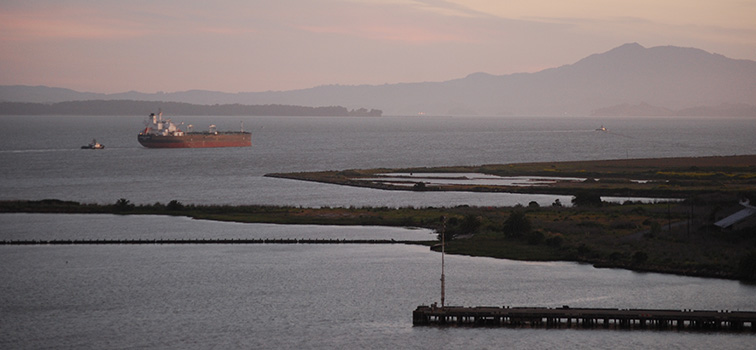What's ahead for San Francisco Bay in 2016? Here are the top pollution threats Baykeeper foresees in the year to come, plus ways we're fighting to stop these threats.

Photo by Joel Williams
By Sejal Choksi-Chugh
Published: January, 2016
What’s ahead for San Francisco Bay in 2016? Here are the top pollution threats Baykeeper foresees in the year to come, plus ways we’re fighting to stop these threats.
Oil Spills. The large number of container ships and oil tankers on San Francisco Bay create a constant risk for oil spills. But now the oil industry is upping the risk, by pushing to ship millions more barrels of oil to the Bay Area for processing and export.
If the oil industry gets its way, tanker traffic on the Bay would increase. Dirty and explosive crude oil would also be shipped into the Bay Area by rail, much of it in tank cars not designed for volatile substances. Train tracks used for shipping oil run along the Bay’s shore and through local communities. An oil train derailment in the Bay Area could cause a major disaster.
But in a recent victory, Baykeeper helped stop a crude oil storage facility proposed for the Pittsburg shoreline. The facility was a key component of the oil industry’s strategy to expand oil refining along the Bay. Next year, Baykeeper will build on this victory, and work to stop all planned Bay Area oil refinery expansions.
Coal. Those railroad tracks that run through local communities and alongside San Francisco Bay are the potential site of coal pollution, a second major threat to the Bay’s health in 2016. Developers are proposing to open shipping terminals in Oakland and Vallejo. Coal would be shipped in by rail and exported to foreign countries. The coal would arrive in long trains of open cars, shedding toxic dust and pieces of coal. Coal could also be spilled into the Bay during the loading of ships.
Coal contains arsenic and other toxins. Coal dust pollution can have effects that range from asthma in kids to interference with fish reproduction. Baykeeper has joined with the Sierra Club and other organizations to keep coal pollution out of the Bay and local communities. We’re advocating for Oakland and Vallejo city leaders to prevent the export of coal from their cities. Coal export is stalled for now, and we won’t quit until it’s stopped for good.
Trash. Whenever it rains, trash washes into San Francisco Bay, and into creeks and rivers that flow to the Bay. City governments are legally required to reduce this pollution, but they’re making little progress.
Baykeeper conducted a two-year investigation that showed that among Bay Area cities, San Jose has some of the highest levels of trash and other contamination washing into creeks and the Bay. We sued San Jose under the Clean Water Act to get the city to stop the pollution. We are now negotiating with San Jose city leaders to help them develop effective pollution controls, including measures to collect and reuse storm water to help ease drought. And once San Jose agrees to keep trash out of the Bay, we’ll use it as a model to get other Bay Area cities to clean up.
Toxic industrial pollution. Another rainy-season pollution threat to the Bay is runoff from Bay Area industrial facilities. Rain falls on outdoor industrial areas, picks up contaminants that include toxic metals and petroleum hydrocarbons, and flows into storm drains. The storm drains empty into creeks that flow to the Bay, or into the Bay itself. Industrial runoff can harm fish, other Bay wildlife and people who spend time on or in the water.
Baykeeper lawsuits require 29 highly-polluting industrial facilities to install controls to protect the Bay from toxic runoff. During 2016, we’re going to ensure that these facilities follow through with effective pollution controls. In addition, we’ll sue 10 more industrial facilities to compel them to stop polluting the Bay. And we’ll investigate 250 more.
Biggest threat of all. The biggest threat of all would be if no one cared enough to try to stop these threats to the Bay. You can keep that from happening. To learn more about how you can get involved in protecting San Francisco Bay and support Baykeeper’s work, visit our website at baykeeper.org.
Sejal Choksi-Chugh is the Executive Director of San Francisco Baykeeper. Baykeeper uses on-the-water patrols, science, advocacy and the courts to stop San Francisco Bay pollution. To report pollution, call Baykeeper’s hotline at 1-800-KEEP-BAY, e-mail hotline@baykeeper.org, or click “Report Pollution” at www.baykeeper.org.

